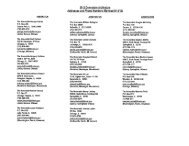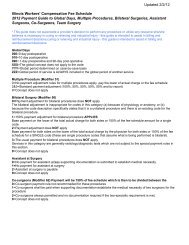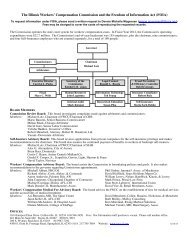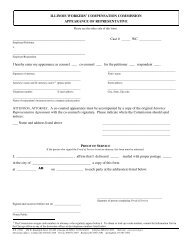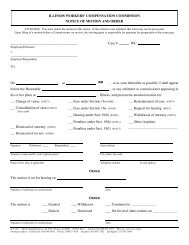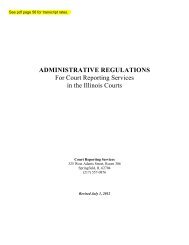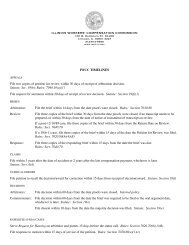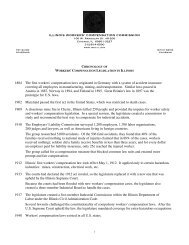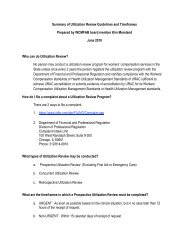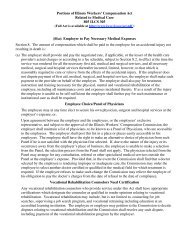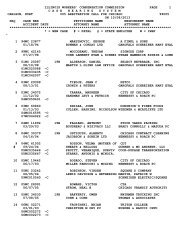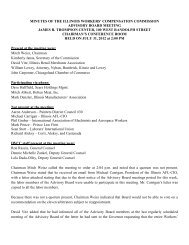illinois workers' compensation commission - IWCC - State of Illinois
illinois workers' compensation commission - IWCC - State of Illinois
illinois workers' compensation commission - IWCC - State of Illinois
Create successful ePaper yourself
Turn your PDF publications into a flip-book with our unique Google optimized e-Paper software.
OVERVIEW OF<br />
WORKERS' COMPENSATION<br />
Workers' <strong>compensation</strong> laws were the first acts <strong>of</strong> social legislation passed in the United <strong>State</strong>s, and they<br />
have always been controversial. At the beginning <strong>of</strong> the 20th century, employers feared the assumption <strong>of</strong><br />
liability for work-related injuries would destroy their businesses, while workers feared financial ruin from<br />
disabling injuries.<br />
Before the laws took effect, an injured worker seeking <strong>compensation</strong> had to file a lawsuit against his or her<br />
employer in court. At the time, the common law held that the employer had a duty to provide a safe place to<br />
work and safe tools; to give warnings <strong>of</strong> dangers; and to provide a sufficient number <strong>of</strong> appropriate fellow<br />
servants to perform the tasks.<br />
In court, the employee had to prove negligence. The employer could present a defense that blamed the<br />
injured worker's contributory negligence, or attributed the injury to the negligence <strong>of</strong> a fellow servant, or<br />
argued that the employee assumed certain risks in accepting the job. The process was prolonged and<br />
uncertain, with large risks to both employee and employer.<br />
The high injury and death rates throughout the Industrial Revolution and growing dissatisfaction with the<br />
common law gradually led to the enactment <strong>of</strong> employer liability acts. Employers were held more<br />
responsible for negligence, but employees still had to file lawsuits for damages.<br />
The first <strong>workers'</strong> <strong>compensation</strong> laws originated in Germany in 1884 with a compulsory system <strong>of</strong> accident<br />
insurance covering all employees in manufacturing, mining, and transportation. Similar laws passed in other<br />
European countries.<br />
In the U.S., laws were passed on a state-by-state basis. Most <strong>of</strong> the early laws covered only hazardous<br />
occupations and were frequently challenged as unconstitutional. Maryland passed the first act in 1902,<br />
which was restricted to fatal cases. The first law <strong>of</strong> general application that withstood legal challenges was<br />
Wisconsin's act <strong>of</strong> 1911. <strong>Illinois</strong> passed its law in 1911, effective May 1, 1912. It took until 1948 for all<br />
states to establish a <strong>workers'</strong> <strong>compensation</strong> law.<br />
Workers' <strong>compensation</strong> laws contain two trade<strong>of</strong>fs:<br />
1. Employees gave up their right to sue and potentially win large awards in court in exchange for more<br />
modest but prompt <strong>compensation</strong>;<br />
2. Employers gave up their common law defenses in exchange for limits on their liabilities.<br />
Workers' <strong>compensation</strong> was established as a no-fault system. The theory behind the law is that the cost <strong>of</strong><br />
work-related injuries or illnesses should be part <strong>of</strong> the cost <strong>of</strong> the product or service.<br />
Originally, the courts administered the <strong>Illinois</strong> act. The volume overwhelmed the courts, however, and on<br />
July 1, 1913, a three-member Industrial Board was created. In 1917, a five-member Industrial Commission<br />
was created within the <strong>Illinois</strong> Department <strong>of</strong> Labor. In 1957, the Commission separated from the<br />
Department <strong>of</strong> Labor and became a self-standing agency. On January 1, 2005, the agency <strong>of</strong>ficially became<br />
the <strong>Illinois</strong> Workers’ Compensation Commission.<br />
Almost every employee who is hired, injured, or whose employment is localized in <strong>Illinois</strong> is covered by<br />
<strong>workers'</strong> <strong>compensation</strong>. For the most part, benefits are paid for accidental injuries that are caused, in whole<br />
or in part, by the employee's work. This includes the aggravation <strong>of</strong> a pre-existing condition and injuries<br />
brought on by the repetitive use <strong>of</strong> a part <strong>of</strong> the body.<br />
<strong>Illinois</strong> employers pay for <strong>workers'</strong> <strong>compensation</strong> benefits through insurance policies or by self-insurance.<br />
Benefits are based on the worker's earnings, subject to certain limits. Cases are first heard by arbitrators,<br />
whose decisions may be appealed to <strong>commission</strong>ers. Cases may proceed on to the circuit court, <strong>Illinois</strong><br />
Appellate Court, and the <strong>Illinois</strong> Supreme Court. Most cases, however, are settled between the parties.<br />
4



